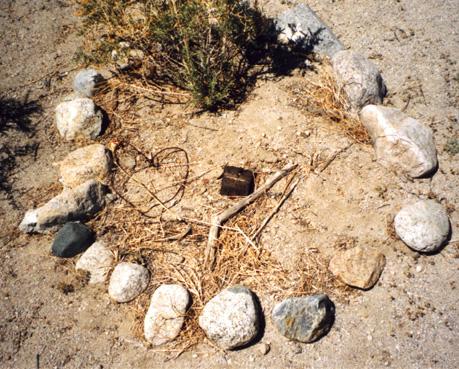MANZANAR
Internment Camp for Japanese-Americans Detained during WWII.
Let's Not Do This Again, OK?
Just north of Lone Pine, CA, and on the edge of desert east of the Sierra Nevada range, the grounds are now a national monument. I visited a few years ago. Here are some pictures.

Above is the entrance. As you can see there's not much left. The grounds are barren desert and scrub, crisscrossed with overgrown dirt roads. Pipes and wires come out of the ground everywhere, and ruined foundations are hidden by bushes. Walking around you are struck by how enormous it was, how remote and isolated it is now, and how much more so it must have been 60 years ago when the west was much less developed than it is now. There is a plaque there which reads, more or less, "Never Again."

Beautiful setting, I suppose. At least they had nice scenery, if not much else. People were born, lived and died in this camp. Above is the camp cemetery. Most of the graves are unmarked except for anonymous circles of stones and chunks of scrap concrete. You can see one in the very far left of this picture; there were more off to the left and behind. The large monument, placed after the war, simply reads, as noncontroversially as possible, "For All The Dead." Wreaths and flowers are left there by visitors even now.

This is one of the unmarked graves. This one, like many there, is adorned only with a small heart made out of a scrap of barbed wire. You can see it just left of center.
Yes, let's not do this again.
UPDATE FEB 2003
N.C. Congressman OK With Internment Camps
U.S. National - AP
Wed Feb 5, 2003, 11:08 PM ET
HIGH POINT, N.C. - A congressman who heads a homeland security subcommittee said on a radio call-in program that he agreed with the internment of Japanese-Americans during World War II.
Rep. Howard Coble, R-N.C., made the remark Tuesday on WKZL-FM when a caller suggested Arabs in the United States should be confined. Another congressman who was interned as a child criticized Coble for the comment, as did advocacy groups.
Coble, chairman of the Judiciary Subcommittee on Crime, Terrorism and Homeland Security, said he didn't agree with the caller but did agree with President Franklin D. Roosevelt, who established the internment camps.
"We were at war. They (Japanese-Americans) were an endangered species," Coble said. "For many of these Japanese-Americans, it wasn't safe for them to be on the street."
Like most Arab-Americans today, Coble said, most Japanese-Americans during World War II were not America's enemies.
Still, Coble said, Roosevelt had to consider the nation's security.
"Some probably were intent on doing harm to us," he said, "just as some of these Arab-Americans are probably intent on doing harm to us."
Rep. Mike Honda, D-Calif., a Japanese-American who spent his early childhood with his family in an internment camp during World War II, said he spoke with Coble on Wednesday to learn more about his views.
"I'm disappointed that he really doesn't understand the impact of what he said," Honda said. "With his leadership position in Congress, that kind of lack of understanding can lead people down the wrong path."
The Japanese American Citizens League asked Coble to apologize and said he should be removed from his committee chairmanship.
"We are flabbergasted that a man who supports racial profiling and ethnic scapegoating" chairs the subcommittee, the group's national executive director, John Tateishi, said in a statement Wednesday.
The Council on American-Islamic Relations demanded that Coble explain his remarks. Spokesman Ibrahim Hooper said the comments were "particularly disturbing."
In 1988, President Reagan signed a bill authorizing reparations of $20,000 for each surviving camp veteran.